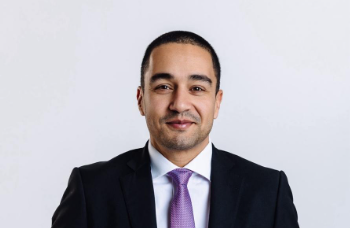Real leadership is about shaping the narrative in today’s hyper-connected, constantly disrupted digital economy. Loukas Tzitzis is one of the rare voices doing just that.
A passionate tech entrepreneur and a former executive of global powerhouses such as Amdocs, Gentrack and Tech Mahindra, Loukas is an award-winning, visionary business and technology executive with a 30-year career in multiple geographies and technology domains. His strategic insights on how tech businesses can leverage disruptive technologies to stay ahead of the curve and competitors are becoming essential reading for tech leaders across the globe.
We spoke to Loukas to discuss his vision for the future and where he is headed next.
AI’s Transformative Impact: Hype or Reality?
AI is reshaping every sector, and Loukas sees its potential as limitless: “AI is the definition of an economic disruptor. No segment of the global economy will remain untouched.
Beyond the transformative potential we are already seeing in Fintech and Cybersecurity, AI is already revolutionising diagnostics, precision medicine, patient care, and drug discovery at an astonishing pace. There are also several well-documented use cases in Transportation, Robotics, Manufacturing, Education, as well as multiple other segments.
Many still underestimate the sheer scale of automation and machine learning already embedded in today’s financial systems, from high-frequency trading and fraud detection to intelligent customer service. I am particularly intrigued by the emerging power of autonomous AI agents in financial services. We are now on the brink of seeing self-reliant ‘Robo-advisors’ driving algorithmic trading with minimal human oversight. These agents are enhancing predictive modelling for volatile asset classes like cryptocurrencies and are rapidly positioning themselves as pivotal enablers of financial decentralisation.
However, with this momentum comes enormous responsibility. Risk mitigation, ethical guardrails, and global inclusion must become non-negotiable. Equally critical is the need to eliminate bias in training data, transparency in mission-critical AI models, and smart, balanced regulation that protects without stifling innovation. We must never relinquish human supervisory control over AI systems. The obligation to deliver the benefits and contain the risks rests firmly with us.
Notwithstanding the above, we need to be honest with ourselves about a critical point that is the ultimate demarcation between hype and reality. As far as I am concerned, we are very early on in this journey, and we need to change the current “build” path or face catastrophic business consequences!
We are in the Artificial Narrow Intelligence era (ANI), and we have some ways to go before we get to AGI (General Intelligence) and ASI (Super Intelligence), concepts that will truly deliver some of the expectations that we have been hearing about in the last 2-3 years. Moreover, and based on the technical development paradigm to date, the current costs of enabling only the foundational layer of AI are so exorbitant that I struggle to see how we can build an economically viable and globally inclusive value chain and supply chain, from AI foundation to customers, across both developed and developing nations. I believe in specialised, small language models (SLMs), with proprietary data lakes that leverage domain-specific data to generate new “data & insights” that will drive continuous, iterative and collaborative growth. I firmly believe that this is the right ethos and way forward for most companies and countries.
All in all, AI has the potential to reshape how we live, work, and interact. The only variables are time, the right balance of incubation and regulation, and optimising investments to unlock benefits delivery globally.”
Choosing the winners in Business & Tech
Loukas believes that technology’s true power lies in its ability to democratise opportunities and create inclusivity by enabling the constant emergence of new capable companies on a global scale.
Eager to learn how Loukas decides on the next technologies and companies to work with, we asked, “What is your framework for selecting the right technology and business at any point in time?”
“Innovation isn’t about chasing dreams that cannot be executed! It is about building for long-term relevance at the right time, in the right space and with the right people. We also forget that innovation is not only about technology: Business & market innovation is also a critical component of innovation overall!
Between 2015-2023, the dominant mindset was ‘grow at all costs”, and that truly skewed the picture for anyone trying to understand what technologies and companies to be involved in! Even more so, the ZIRR era created a culture where business & technology fundamentals were ignored, leading to some decisions that I would call politely “questionable”! Luckily, that model of companies burning cash on any technology is collapsing, and while recent macroeconomic developments have severely impacted years of trending growth, I am happy to see that we are returning to considering the fundamentals! Innovation efforts must lead to companies developing sustainable, not just scalable, deliverables, which I call “innovation on the money”.
“Innovation on the money” is about understanding what can influence the adoption curve and the right time to “enter the fray” so that a given company can achieve optimal ROI on its innovation efforts! The important thing is to develop an assessment framework that combines business and technological criteria and then apply that in a manner that makes sense for the specific company in question. After 25 years, I have come to appreciate that the criteria that can meaningfully “shift the needle” in the adoption curve are consistent, but what changes are the desired target outcomes, depending on the geography and type of company: for example, there are different considerations for a corporate relative to a startup and geographical considerations also play a part.
All in all, it is essential not to be too early or too late to enter a market and to constantly adjust monetisation and capital-raising pathways relative to the macro- and micro-environment in which a company is operating: peer-to-peer services, usage-based pricing, subscription layers, loyalty economies, defi-based funding and adjacent value-adding functions like commerce or logistics all play a crucial part now, but that was certainly not the case back in 2015.
Take for example Cyber Physical Systems (CPS) and Cybersecurity! The TRITON attack happened in 2017, and I recall giving an interview about IioT and Cybersecurity in CPS in the Middle East in 2019. Yet, I think it is only now that we can genuinely say that we have reached the necessary “critical mass” in the whole ecosystem for the importance of CTEM in CPS to come front and centre!
Most professionals know that the real moat isn’t tech by itself, but winners of our era will be companies that will leverage tech to enable not just loyalty but the creation of communities! Features can be cloned. Markets can be disrupted. But a community of deeply engaged customers who are involved deep enough to be practically vested in your success? That’s incredibly hard to replicate.”
Leadership: Winning by giving back and enabling success
On leadership and his leadership journey, Loukas reflected, “I have been fortunate to have worked alongside incredibly bright, accomplished professionals from all over the world who imparted excellent advice to help me throughout my career. No one is ever wise enough to stop learning, and I will, therefore, always be grateful for their continuous advice, support, and guidance.
If I had to select business advice that has helped me the most, I would have to go with adjusting and respecting different cultures, focusing on EQ rather than IQ, being consistent, working hard, building bridges, being a top 1% communicator, and surrounding myself with people that are more intelligent, more experienced and more accomplished. However, their most important advice has been to learn to sell! I don’t just mean sales in the commercial sense. You must be able to sell your ideas, vision, and strategy internally and externally. If you can sell, then you have a chance at winning. Make no mistake; winning is what truly matters. Those that play to participate and do not sell are quickly and easily forgotten.
We as leaders must balance empathy and friendliness, handle conflict with care, embrace ‘growing pains’ for progress and proactively address change. Building high-performing teams often requires tough decisions. Sharp, simple, and clear communication is key!
Regarding my leadership style, my principles include transparency, empowerment, mentorship, accountability, adaptability, and collaboration. I expect a lot, but I will fully support your growth if you’re a team player, proficient in your domain, deliver results, and bring the right energy. I have never believed in leadership by authority, but I do believe in reaching fast, intelligent decisions and taking decisive action. The best ideas come from engaging the right people for a task and guiding them through their collaboration, challenging existing models while giving them the freedom to think beyond limitations.
Importantly, leaders are also people, and leadership is like a mixed athletics event, alternating between sprints and marathons. It is essential that leaders also take care of themselves!”
Building the Infrastructure for Tomorrow
Loukas Tzitzis stands at the intersection of technological innovation and human-centred strategy. His ideas are grounded, actionable roadmaps for business leaders navigating what comes next.
He explains: “As business leaders, we have a dual obligation: to deliver tangible benefits through business-centric innovation and continuously contribute towards a better, more inclusive global future where people can share both the benefits and success of technologically powered progress. We live in a time where meaningful contributions towards delivering these objectives can come from anywhere! The United States, India and other large countries have been global powerhouses in software for a long time, but 10+ years of technology democratisation and digitalisation have enabled the emergence of companies that can sustainably make a difference on a global scale!
Take, for example, my home country, Greece. As recently as 5-10 years ago, no one would have considered any Greek tech startup or SMB a serious contender for international business.
However, after 30 years of living abroad, I have returned to Greece to find a flourishing innovation and startup ecosystem and SMB companies with impressive competence and skills, built through 30 years of operation in a very turbulent market and recent experience in complex B2G and B2B transformation projects they are currently running in Greece. They are ready to take on international companies outside their current captive markets, and Greece’s currently booming economic & business environment would certainly play in their favour internationally.
The world has become a globally interconnected marketplace and there has never been a better time to make a difference through the power of technology!”



































